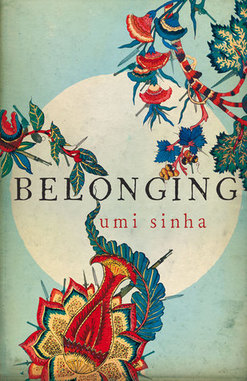| Crouching on a high shelf beside the fanlight above the dining room doors, twelve-year-old Lila watches her parents and their guests sit down to a celebratory dinner. Her mother has embroidered the tablecloth in honour of her father’s fiftieth birthday, but the intricate design is obscured by the plates, placemats and silver platters. When these are finally removed, Lila still can’t get a clear sight of her mother’s handiwork, but she takes in the anger and disgust of the guests as they flee the room. Curious, she follows her father to his study where, before the adults usher her away, she sees the blood-strewn walls and smells the cordite. |
Belonging is a quiet novel on a broad canvas, a novel about violence, from the absurdities of the British Raj to the damage wrought by family secrets when “we carry our parents inside us, their blood in our veins, their voices in our heads” (p311). It shows how resentment was engendered within the indigenous population when the relationship changed from commercial to imperial, culminating in the horrific Siege of Cawnpore. (I’m sure I’ve read about this in another novel, but haven’t been able to trace it.) It’s also about snobbery and the fantasy of racial purity, and the tragic consequences for those who don’t quite fit.
I liked this novel and my quibbles and more about my own limitations as a reader than the book itself, so no need to indulge me by reading on. I appreciate a time-fractured narrative with distinct points of view, but I struggle to keep track when we move back and forth between members of different generations of the same family at different points in time, as this does. While the Indian characters are sympathetically drawn, and the impact on them of structural inequalities is cleverly depicted, I thought it a pity that, with three point of view characters, all were of English stock. But without them it wouldn’t have worked so well as a family saga, and I did enjoy finding out just how Lila’s mother had stitched her disturbance into the tablecloth and where the origins of that disturbance might lie.
Thanks to Brighton-based small press Myriad Editions for my review copy.






















 RSS Feed
RSS Feed





















